
Chester "Chet" Lauck was a comic actor who played the character of Lum Edwards on the classic American radio comedy Lum and Abner.

Lum and Abner was an American network radio comedy program created by Chester Lauck and Norris Goff that was aired from 1931 to 1954. Modeled on life in the small town of Waters, Arkansas, near where Lauck and Goff grew up, the show proved immensely popular. In 1936, Waters changed its name to "Pine Ridge" after the show's fictional town.

Born to Kill is a 1947 RKO Pictures American film noir starring Lawrence Tierney, Claire Trevor and Walter Slezak with Esther Howard, Elisha Cook Jr., and Audrey Long in supporting roles. The film was director Robert Wise's first film noir production, preceding his later work on The Set-Up (1949) and The Captive City (1952).
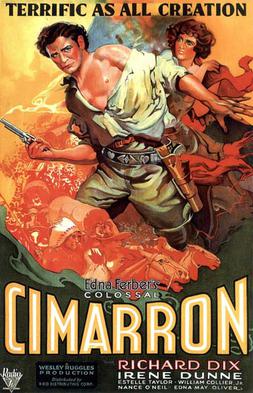
Cimarron is a 1931 pre-Code epic Western film starring Richard Dix and Irene Dunne, and directed by Wesley Ruggles. Released by RKO, it won Academy Awards for Best Picture, Best Adapted Screenplay (written by Howard Estabrook and based on Edna Ferber's 1930 novel "Cimmaron", and Best Production Design.

Millie (1931) is an American pre-Code drama film directed by John Francis Dillon from a screenplay by Charles Kenyon and Ralph Morgan, based on a novel of the same name by Donald Henderson Clarke. The film was an independent production by Charles R. Rogers, distributed by RKO Radio Pictures, after their acquisition of Pathé Exchange. It stars Helen Twelvetrees in one of her best roles, with a supporting cast that includes Lilyan Tashman, James Hall, Joan Blondell, John Halliday and Anita Louise.
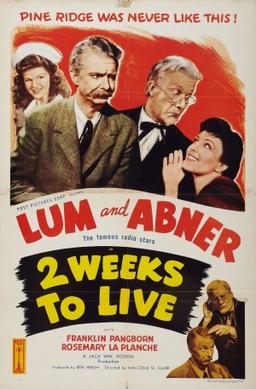
Two Weeks to Live is a 1943 American Lum and Abner film directed by Malcolm St. Clair.
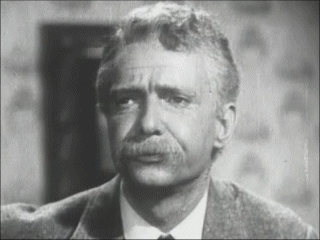
The Bashful Bachelor is a 1942 American film directed by Malcolm St. Clair. It is the second of seven films based on the Lum and Abner radio series created by and starring Chester Lauck and Norris Goff.
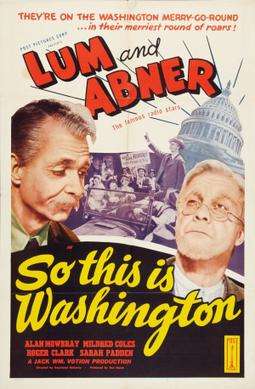
So This Is Washington is a 1943 American film directed by Ray McCarey starring Chester Lauck. The film was nominated for the Academy Award for Best Sound Recording. It is also known as Dollar A Year Man.

Dreaming Out Loud is a 1940 American film based on the radio series Lum and Abner, directed by Harold Young starring Chester Lauck and Norris Goff. It is also known as Money Isn't Everything.

RKO Radio Pictures Inc., commonly known as RKO Pictures or simply RKO, was an American film production and distribution company, one of the "Big Five" film studios of Hollywood's Golden Age. The business was formed after the Keith-Albee-Orpheum theater chain and Joseph P. Kennedy's Film Booking Offices of America studio were brought together under the control of the Radio Corporation of America (RCA) in October 1928. RCA executive David Sarnoff engineered the merger to create a market for the company's sound-on-film technology, RCA Photophone, and in early 1929 production began under the RKO name. Two years later, another Kennedy concern, the Pathé studio, was folded into the operation. By the mid-1940s, RKO was controlled by investor Floyd Odlum.
Mena High School is an accredited public secondary school located in Mena, Arkansas, United States. The school provides comprehensive education to more than 550 students annually in grades nine through twelve. Mena High School is the largest of four public high schools in Polk County and is the sole high school administered by the Mena School District.

The Farmer in the Dell is a 1936 American comedy film directed by Ben Holmes from a screenplay by Sam Mintz and John Grey, adapted from Phil Stong's 1935 novel, which was similarly titled, Farmer in the Dell. The film was premiered by RKO Radio Pictures in New York City on March 6, 1936, and released widely later that month on March 27. It stars Fred Stone, Jean Parker, and Esther Dale.

Don't Tell the Wife is a 1937 American comedy film directed by Christy Cabanne using a screenplay by Nat Perrin adapted from the play, Once Over Lightly, written by George Holland. The film stars Guy Kibbee, Una Merkel, and Lynne Overman, with Lucille Ball, William Demarest, and Academy Award winner Hattie McDaniel in supporting roles. Produced by RKO Radio Pictures, it premiered in New York City on February 18, 1937, and was released nationwide on March 5.

Danger Patrol is a 1937 American drama film directed by Lew Landers from a screenplay by Sy Bartlett based on a story by Helen Vreeland and Hilda Vincent. Produced and distributed by RKO Radio Pictures, it was released on December 3, 1937, and stars Sally Eilers, John Beal, and Harry Carey.
Gildersleeve's Bad Day is a 1943 American comedy film directed by Gordon Douglas from a screenplay by Jack Townley. The picture was the second in the Gildersleeve's series produced and distributed by RKO Radio Pictures, based on the popular NBC radio program, The Great Gildersleeve, created by Leonard L. Levinson, and was released on June 10, 1943. The film stars Harold Peary, Jane Darwell and Nancy Gates.

Partners in Time is a 1946 American comedy film directed by William Nigh and written by Charles E. Roberts. The film stars Chester Lauck, Norris Goff, Pamela Blake, John James, Teala Loring and Danny Duncan. The film was released on April 25, 1946, by RKO Pictures.
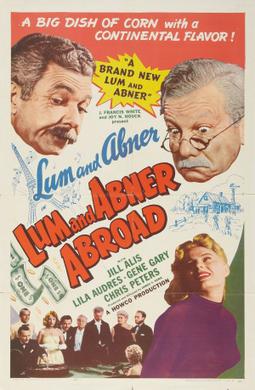
Lum and Abner Abroad is a 1956 European comedy film directed by James V. Kern and written by Carl Herzinger. The film stars Chester Lauck, Norris Goff, Jill Alis, Lila Audres, Gene Gary, and Chris Peters. The film was released on January 1, 1956.
Hollywood Star Time was a radio interview program in the United States. It was initially broadcast on 20 Pacific Coast and Rocky Mountain stations beginning February 28, 1944. Later the 15-minute program was carried nationwide on the Blue Network May 29, 1944 – November 24, 1944.

Samuel J. Briskin was one of the foremost producers of Hollywood's Golden Age, and head of production during his career at three of the "Big 8" major film studios: Columbia Pictures (twice), Paramount Pictures, and RKO Pictures. In the late 1950s, he was briefly on the board of directors of another major, Metro-Goldwyn-Mayer. During World War II, Briskin served in the army's Signal Corps as a film producer, attaining the rank of lieutenant colonel. After the war he co-founded Liberty Films with Frank Capra. They were later joined by William Wyler and George Stevens. The studio only produced two films, but both are now considered classics: It's a Wonderful Life and State of the Union. All three of his brothers were also film producers, as well as one of his sons, and his sister was married to the eventual Chairman of Columbia, where Briskin spent the last decade of his life as a vice-president and head of production until his death in 1968 from a heart attack.
Lee Marcus, also known as Lee S. Marcus, was an American film producer of the 1930s and 1940s. During his fifteen-year career he produced over 85 films, most of them between 1934 and 1941 while he was at RKO Studios. Prior to his production career, Marcus worked for FBO and then RKO as a sales executive, reaching the level of vice president in both organizations. At RKO, he was head of production of the studio's b-films during the late 1930s and the beginning of the 1940s. He was also responsible for producing what many consider to be the first film noir, 1940's Stranger on the Third Floor.
















